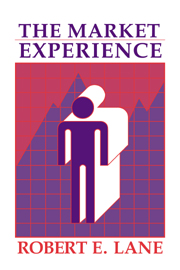Part VII - Utility and happiness
Published online by Cambridge University Press: 18 December 2009
Summary
I have suggested two maximands for the market: human development and happiness. Our discussion up to this point has focused more on the conditions of human development (specified as cognitive complexity, personal control, and self esteem) than on happiness, although inevitably hedonic states have entered the analysis. It could not be otherwise. Even though the two goods are separate, the discussion of each implies acknowledgment of the other. When they conflict, that conflict must be noted and the usual alternative basis for support, ethics, must be shown to be supportive. When they are congruent, the hedonic rewards of developmental processes are important incentives for engaging in those processes.
It is for these reasons that there have been many references to hedonic moods in the interpretations of the market experience. Thus, the development of cognitive complexity by the market was placed in the context of joy and sorrow as well as such emotions as pity, guilt, or anger. The hopes and fears stimulated by money symbols are freighted with hedonic implications; insecurity obviously influences happiness as well as the thinking processes noted; one protects one's sense of personal control and self-esteem because one feels unhappy at their loss; we do not object to unemployment solely because of the waste of human resources but also because it makes people miserable; the inability of a system of exchange to comprehend intrinsic motivations is a defect because it deprives people of important pleasures; the frequent failure of money to promote happiness is itself a failure whether or not it also distorts market choices. Over the long journey to this point we have inevitably touched on happiness, the subject of Part VII.
- Type
- Chapter
- Information
- The Market Experience , pp. 423 - 426Publisher: Cambridge University PressPrint publication year: 1991

